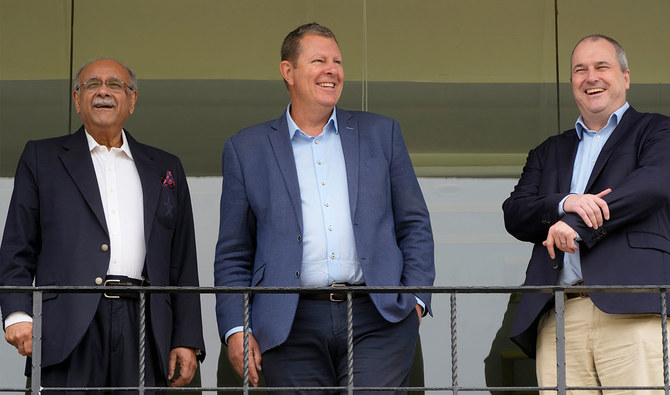ISLAMABAD/KARACHI: Tax lawyers and real estate experts said on Wednesday Pakistani authorities should initiate a probe to determine factors behind the flight of capital and possible tax evasion following a new leak of records that revealed the offshore real estate wealth of the country’s political, military and business elite.
Dubai Unlocked, an investigative project involving more than 70 media outlets around the globe, has revealed the ownership of properties in the Emirate of prominent global figures, including alleged money launderers and drug lords, political figures accused of corruption and their associates, and businessmen sanctioned for financing terrorism, among others.
The data spans 2020 and 2022, and only includes residential properties.
“This is a serious issue of capital flight, therefore the Federal Board of Revenue should launch a thorough probe following the data leak,” Dr. Ikram ul Haq, an economist and tax layer, told Arab News.
He said the probe should determine whether Pakistanis had bought the assets through legitimate funds or not, adding that Pakistanis who bought properties in Dubai were legally bound to declare their rental incomes and any profit proceeds from real estate in annual tax returns.
“Pakistanis can transfer $500,000 abroad for investments with prior approval of the central bank,” Dr. Haq explained. “It is now up to the FBR [Federal Board of Revenue] to see if the funds are legally remitted to Dubai for the investments and the assets are properly declared by their owners.”
The FBR and Pakistan’s Federal Investigation Agency could not be reached for comment despite several calls and text messages.
Pakistanis listed in the leaks include President Asif Ali Zardari’s three children, former prime minister Nawaz Sharif’s son Hussain Nawaz Sharif, Interior Minister Mohsin Naqvi’s wife, Sindh provincial minister Sharjeel Memon and family members, Senator Faisal Vawda, Pakistan Tehreek-e-Insaf lawmaker Sher Afzal Marwat, and half a dozen lawmakers from the Sindh and Balochistan assemblies.
The Pakistani list also features the late Gen (retired) Pervez Musharraf, former prime minister Shaukat Aziz, former army chief Qamar Javed Bajwa’s son, and more than a dozen retired army generals as well as a police chief, an ambassador and a scientist, all of whom owned properties either directly or through their spouses and children.
Pakistani politicians and others were last named in the 2016 Panama Papers, leaked documents that showed how the rich exploit secretive offshore tax regimes.
Abdul Basit, an Islamabad-based tax consultant, also said the FBR could seek information on whether the properties revealed in the leaks were declared in tax returns or not.
“If an owner of an offshore property fails to prove the asset in Dubai is bought through legitimate money, the tax authority can impose a fine on the beneficiary,” Basit told Arab News.
Meanwhile, real estate experts said lacklustre governance, rapid currency depreciation and poor taxation policies related to the sector in Pakistan were the main factors driving people to invest in Dubai’s residential properties.
“Dubai remains a top destination for real estate investment in 2024 thanks to its dynamic economy, favorable government policies, and robust infrastructure,” Faizan Munshey, an expert on Dubai’s real estate investments, told Arab News.
“Key factors include Dubai’s tax-free environment, booming economy, safe and stable environment, and thriving tourism industry.”
Munshey added that Dubai also offered a strong rental market, impressive return on investments, and projects from world-class developers that made it an attractive choice for both local and international investors.
Asif Sumsum, chairman of the Association of Builders and Developers of Pakistan (ABAD), said Pakistan’s real estate sector had “huge potential” and could provide employment to thousands and contribute to the national exchequer.
Sumsum urged the government to revisit its policies related to the sector.
“Pakistani rulers and the incumbent government must think why Pakistanis are buying real estates in other countries, why people feel insecure in Pakistan and they opt for a second home abroad,” he said.
Muhammad Ahsan Malik, a real estate analyst, pinpointed four important factors that had discouraged investments in Pakistan’s real estate sector.
“Currency devaluation, high interest rate, poor government policies, and bad taxation of the real estate sector are among the key elements that discourage investments in Pakistan’s real estate,” Malik told Arab News.
POLITICIANS OFFER EXPLANATIONS
Pakistani politicians reacted to the Dubai Unlocked revelations, saying they had bought the properties as per law and declared them to authorities.
Explaining his position on the issue, Pakistan’s interior minister Mohsin Naqvi said the Dubai property bought in his wife’s name in 2017 was fully declared and listed in tax returns.
“It was also declared in returns submitted to the Election Commission as caretaker CM [chief minister] of Punjab,” he said in an X post. “The property was sold a year ago, and a new property was purchased recently with the proceeds.”
Pakistan Tehreek-e-Insaf (PTI) lawmaker and ex-PM Imran Khan aide, Sher Afzal Marwat, admitted he owned an apartment in Dubai, but had declared it with authorities in Pakistan, including the Federal Board of Revenue and the Election Commission of Pakistan.
“It can be confirmed with both the FBR and as well as ECP,” he said.
President Zardari’s Pakistan Peoples Party also said the properties of its leaders in Dubai had been duly declared in tax returns.
The property records at the heart of the Dubai Unlocked project come from multiple data leaks, mostly from the Dubai Land Department, as well as publicly owned utility companies. Taken together, the data provides a detailed overview of hundreds of thousands of properties in Dubai and information about their ownership or usage.
The data was obtained by the Center for Advanced Defense Studies (C4ADS), a non-profit organization based in Washington that researches international crime and conflict. It was then shared with Norwegian financial outlet E24 and the Organized Crime and Corruption Reporting Project (OCCRP), which coordinated an investigative project with dozens of media outlets from around the world.
















